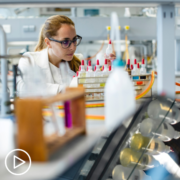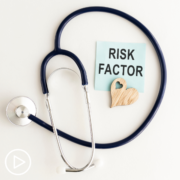Stomach Cancer Screening | How Asian and Latinx Patients Can Self-Advocate
Stomach Cancer Screening | How Asian and Latinx Patients Can Self-Advocate from Patient Empowerment Network on Vimeo.
How can Asian and Latinx patients self-advocate for gastric cancer screening? Expert Dr. Joo Ha Hwang from Stanford Medicine shares advice for how patients can discuss gastric cancer screening with their provider and how providers should be engaging with patients for better care.
[ACT]IVATION TIP
“…especially if you come from Korea, Japan, where they actually have instituted national screening, with endoscopy, we actually have U.S. guidelines that state that if you come from a country whose guidelines state you should have endoscopy, then you should also have endoscopy, we should be following your home of origins guidelines for you and so, those patients should also have endoscopy.”
See More from [ACT]IVATED Gastric Cancer
Related Resources:

|

|
 Potential Impact of Artificial Intelligence on Stomach Cancer Detection and Care Potential Impact of Artificial Intelligence on Stomach Cancer Detection and Care |
Transcript:
Lisa Hatfield:
So in the United States, we do have many people from the Asian and Hispanic communities who may be at higher risk for gastric cancer, do you suggest that they talk to their provider about getting screened? And how might they phrase that question? Can I get screened for the H. pylorI? So if you had a patient who wanted to be screened or is interested in getting screened, how might they approach their provider in asking for the screening for gastric cancer or H. pylori?
Dr. Joo Ha Hwang:
I think the first step is to get tested for H. pylori, and pretty much, everyone who is, an immigrant to the U.S. is at much higher risk for having H. pylori, in the past, we used to say that the people from Asia, immigrants from Asia had an 80 percent risk of having H. pylori, from Mexico, it was more like around 60 percent, United States, it was in the 20 to 30 percent, it’s probably less than that now.
So worldwide, prevalence of H. pylori is certainly going down but again, providers should know this is something that is taught in medical school, is areas that are, endemic with H. pylori and providers should also know that, H. pylori is a carcinogen, and so if a patient just comes up in and says I’m worried about having H. pylori, I come from a high-risk population, it really shouldn’t be difficult to get tested for H. pylori, furthermore, if they have any symptoms, especially any epigastric pain what we call dyspepsia that should also trigger the provider to go ahead and test for H. pylori, because that’s part of the algorithm. So I think that all of these, it shouldn’t be difficult to engage a provider on that particular issue.
Lisa Hatfield:
So it is okay and appropriate for a patient to approach their provider and ask that question? So I appreciate that.
Dr. Joo Ha Hwang:
I think it’s important and I think that patients need to be their own advocates, because I have heard of instances where providers have been reluctant and in certain systems they’re discouraged from further testing, because it’s a capitated system. I think H. pylori testing is not that difficult, sometimes if patients want endoscopy, it can be, more challenging but again, especially if you come from Korea, Japan, where they actually have instituted national screening, with endoscopy, we actually have U.S. guidelines that state that if you come from a country whose guidelines state you should have endoscopy, then you should also have endoscopy, we should be following your home of origins guidelines for you and so, those patients should also have endoscopy.
But the challenge with that is that they’re going to end up paying for it, because it’s not typically covered by insurance or it’s not fully covered by insurance so you’d probably have to pay a copay, for something like that at this time.
Lisa Hatfield:
I have a friend who’s dealing with her father who lives in Korea, she’s from Korea, has been here about two, five years. He has stomach cancer. So we’ve been having this discussion, and that’s why I thought I’d ask that last question. She said she sometimes is afraid to approach her provider…
Dr. Joo Ha Hwang:
If you’re afraid to approach your provider, you need a different provider.
Lisa Hatfield:
Well, that’s a good suggestion too.
Dr. Joo Ha Hwang:
No, no. We’re supposed to work with you and listen to you and again, I go around and give a lot of talks to patient groups, and I like engaging in these types of activities, because I think the more information patients have, the more that they can talk with their physicians, and oftentimes patients know more than their physicians do, because they’ve done a lot more research. And hopefully you have a physician with some hubris who will listen to the patient and if they don’t know, they’ll kind of look things up, so yeah.
Lisa Hatfield:
Yeah. I appreciate that, thank you.
Dr. Joo Ha Hwang:
My pleasure.





